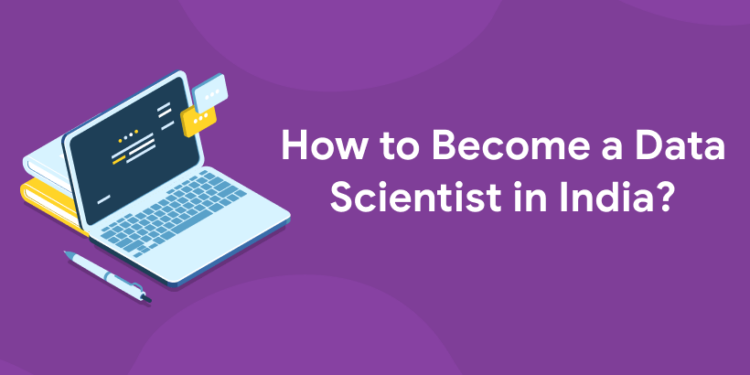Table of Contents
Key Takeaways:
- Data science is a booming, high-paying career with applications across industries in India.
- Strong math, programming, and machine learning skills form the backbone.
- Practical projects and portfolio building are essential to stand out in the job market.
- Advanced skills in deep learning, NLP, and MLOps provide a competitive edge.
- Structured courses with mentorship and placement support accelerate career success.
Introduction
Imagine being the person who turns raw data into life-changing insights — predicting customer needs, optimizing healthcare treatments, or detecting fraud before it happens. This is the power of data science, a field that sits at the heart of every smart decision today, transforming industries and shaping our future. Whether you’re a student, a professional looking for a career change, or just curious about what it takes to enter this dynamic field, the path to becoming a data scientist in India in 2025 is clearer and more achievable than ever.
In India, the data science market is booming with high demand and exciting opportunities across sectors like fintech, healthcare, e-commerce, and agriculture tech. But diving into data science requires more than just technical skills — it demands a mindset of curiosity, problem-solving, and continuous learning. This comprehensive guide will walk you through the steps, tools, and skills needed to chart your data science career and thrive in a technology-driven world.
What is Data Science and Why It Matters?
1: Which of the following algorithms is most suitable for classification tasks?
Data science combines statistics, computer science, and domain expertise to extract insights from data — both structured and unstructured. It powers innovations such as recommendation systems, autonomous vehicles, and personalized medicine. In India, data science is a key driver of digital transformation across industries, creating enormous demand for skilled professionals.
Also read: How to Become a Data Scientist in Kerala?
Key industries relying on data science include:
- FinTech: credit scoring, fraud detection, algorithmic trading
- Healthcare: disease prediction, drug discovery, personalized treatments
- E-commerce: customer segmentation, inventory optimization
- Agriculture Tech: crop and soil monitoring, yield prediction
With the Indian data analytics market forecasted to grow from $3.5 billion in 2024 to over $21 billion by 2030, this is the perfect time to enter data science.
🚀 Start Coding Today! Enroll Now with Easy EMI Options. 💳✨
Equip yourself with in-demand skills to land top-tier roles in the data-driven world.
Start Learning Now with EMI OptionsStep-by-Step Roadmap to Becoming a Data Scientist in India
1. Build a Strong Foundation in Math and Statistics
Math is the language of data science. Start with:
- Linear Algebra: vectors, matrices, operations useful for ML algorithms
- Calculus: understanding derivatives and optimization
- Probability & Statistics: probability distributions, hypothesis testing, regression
- Optimization principles: gradient descent, cost functions in ML Tip: Websites like Khan Academy and MIT OpenCourseWare offer excellent free courses. Entri’s Data Science course integrates these basics with hands-on exercises to solidify understanding.
You might also like: How to Become a Data Scientist Without a Degree
2. Learn Programming – Python, SQL, and Beyond
Python is the most popular language in data science due to its simplicity and powerful libraries (Pandas, NumPy, Matplotlib, Scikit-learn). Learn SQL fluently as data retrieval from databases is essential. R is recommended for statistical modeling and data visualization. Familiarity with Git/GitHub is crucial for version control and collaboration.
3. Master Data Handling and Exploratory Data Analysis (EDA)
Real-world data is messy; cleaning and preparing it is time-consuming yet vital. Learn to tackle missing values, duplicates, and inconsistencies using Pandas. Use visualization libraries like Seaborn and Matplotlib to detect patterns and outliers. Explore BI tools like Tableau or Power BI to convert raw data into interactive dashboards.
4. Understand Core Machine Learning Algorithms
Focus on supervised learning algorithms: linear regression, logistic regression, decision trees, random forests, and support vector machines. For unsupervised learning, explore clustering and principal component analysis (PCA). Evaluate model performance using accuracy, precision, recall, and F1 scores.
Also read: Data Science for Beginners – Basics, Tools, and Programming Languages
5. Dive Into Deep Learning and Natural Language Processing (NLP)
Delve into neural networks and advanced architectures like convolutional neural networks (CNNs) for images and transformers (BERT, GPT) for language understanding. Use PyTorch or TensorFlow frameworks. NLP skills are increasingly critical for applications like chatbots and sentiment analysis in business.
6. Learn Model Deployment and MLOps
Knowing how to deploy models to real-life applications is a key skill. Learn to build APIs with Flask/FastAPI, use Docker for containerization, and manage models at scale using MLflow or Kubeflow. Cloud platforms like AWS, GCP, or Azure provide infrastructure for scalable AI pipelines.
Are you aspiring for a booming career in IT? If YES, then dive in |
||
Full Stack Developer Course |
Python Programming Course |
Data Science and Machine Learning Course |
7. Work on Real-World Projects and Build Your Portfolio
Apply your skills to fresh datasets. Start simple with projects like Titanic survival prediction, then move to advanced domains like time series forecasting, fraud detection, or chatbot development. Host your work on GitHub with detailed readmes and visualizations. Blogging about your projects demonstrates communication skills highly valued by employers.
8. Network, Join Communities and Find Mentors
Join platforms like LinkedIn, Kaggle, and specialized data science forums. Attend local meetups, hackathons, and webinars regularly. Seek mentorship to fast-track learning and open job opportunities.
Elevate your career with Entri’s Data Science course online!
Choose Your Path in Data Science
Data science encompasses many roles:
| Role | Focus and Responsibilities |
|---|---|
| Data Analyst | Cleans, visualizes data, basic reporting |
| Junior Data Scientist | Assists in modeling and analysis |
| Data Scientist | Designs and validates models, interprets results |
| Machine Learning Engineer | Builds scalable ML systems, works on deployment |
| Data Engineer | Manages data pipelines, storage, and infrastructure |
| AI Researcher | Develops novel algorithms and AI technology |
| Business Intelligence (BI) Developer | Creates dashboards and integrates business insights |
| Leadership Roles | Lead teams, strategic planning, Chief Data Officer (CDO) roles |
People also read: How to Become a Data Scientist in Fintech?
Data Scientist Salary Expectations in India (2025)
Salaries vary widely based on experience, skillset, location, and company scale. Here’s a snapshot:
| Experience | Salary Range (INR/year) | Notes |
|---|---|---|
| Entry-level (0-2 yrs) | ₹5,00,000 – ₹8,00,000 | Internships, junior roles |
| Mid-level (3-6 yrs) | ₹10,00,000 – ₹18,00,000 | Hands-on projects, specialization |
| Senior-level (7+ yrs) | ₹20,00,000+ | Leadership, consulting, advanced domain skills |
| Freelancers | ₹500 – ₹2500/hour | Depends on project complexity and expertise |
Note: Specialized skills in AI, MLOps, and cloud boost salary potential.
Read in detail:
Data Scientist Salary Trends in Kerala
Salary of Data Scientists State-wise in India
🚀 Start Coding Today! Enroll Now with Easy EMI Options. 💳✨
Equip yourself with in-demand skills to land top-tier roles in the data-driven world.
Start Learning Now with EMI OptionsTop Skills to Acquire by 2025
- Essential: Python, SQL, data wrangling, statistics, and ML fundamentals
- Advanced: Deep learning, NLP, MLOps, and cloud AI services
- Data Visualization: Tableau, Power BI
- Soft Skills: Effective communication, problem-solving, and business understanding
Get a head start by understanding the basics in our free course!
Certifications to Consider
- Entri’s AI-driven Data Science Course with Placement Assistance
- IBM Data Science Professional Certificate
- Google Data Analytics Professional Certificate
- Microsoft Certified: Azure Data Scientist Associate
- AWS Certified Data Analytics – Specialty
- NASSCOM Data Science Professional Certification (India-focused)
Entri’s Data Science Course: Your Launchpad to a Successful Career
Looking for a comprehensive, AI-integrated, and placement-assisted pathway? Entri’s Data Science course offers practical training across Python, machine learning, NLP, and deep learning with real-world case studies. Their AI-powered mentoring accelerates doubt resolution and learning customization. Plus, dedicated placement support connects you with leading companies, helping you transition confidently into your dream data role.
Course Highlights:
- In-depth curriculum from fundamentals to advanced concepts
- AI-driven personalized learning and doubt clearing
- Hands-on projects for portfolio development
- Placement assistance with interview prep and job connections
- Fully online and flexible learning model
Conclusion
Embarking on a career as a data scientist in India today means stepping into a future-proof, exciting, and impactful profession. With a clear roadmap and dedication, you can harness the power of data to transform businesses and lives. Entri’s Data Science course combines expert guidance, cutting-edge AI integration, and placement assistance to ensure your success. Start your learning journey now and be a part of the wave shaping the world with data.
| Our Other Courses | ||
| MEP Course | Quantity Surveying Course | Montessori Teachers Training Course |
| Performance Marketing Course | Practical Accounting Course | Yoga Teachers Training Course |
🚀 Start Coding Today! Enroll Now with Easy EMI Options. 💳✨
Equip yourself with in-demand skills to land top-tier roles in the data-driven world.
Start Learning Now with EMI OptionsFrequently Asked Questions
How long will it take to become a data scientist?
With structured learning and practice, expect 6-12 months for foundational skills. Mastery is ongoing.
Is a formal degree necessary?
Not mandatory. Coding skills, portfolio, certifications, and problem-solving aptitude are highly valued.
What projects should I start with?
Titanic survival prediction, customer churn analysis, movie recommendation systems.
Can I switch careers to data science later?
Yes. Leverage your existing domain knowledge and focus on building data science skills.
Which languages are best to learn?
Python is most popular, followed by R for statistics. SQL is essential.















